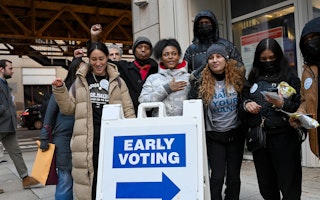Black Students Endure Harsher Punishments in School
By Christopher Scott
The recently released U.S. Department of Education’s Civil Rights Data Collection decisively shows that black and brown youth and students with disabilities face harsher discipline than non-minority students for common actions and behaviors. Across all school districts surveyed, the study found that black students are over three and a half times more likely to be suspended or expelled than their white peers. And over 70 percent of students involved in school-related arrests or referred to law enforcement are black or Latino.
Education Secretary Arne Duncan said that the harsher punishments exist even within the same schools. According to the Associated Press, “Duncan said some school officials might not have been aware of inconsistencies in how they handle discipline, and he hoped the report would be an eye-opener.”
Schools and districts can now no longer hide behind the notion that kids being suspended and expelled are just “bad,”that their overly punitive response to misbehavior is fair and equitable or promotes safety. Moreover, to continue with the use of exclusionary discipline tactics and school discipline policies, in lieu of alternatives, is overtly discriminatory and reinforces a system of institutionalized racism.
A recent Council of State Governments Breaking Schools’ Rules report found, in Texas, less than three percent of violations were related to behavior for which state law requires expulsion or removal for safety reasons (i.e. guns, weapons, violent assaults, etc.), but nine times out of ten, a student was suspended or expelled for behavior violating the schools' discretionary code of conduct. The report dug deeper and found that black 9th graders have a 31 percent higher likelihood to be removed for discretionary violations, but are less likely to be removed for mandatory violations.
Could expelling and suspending students truly be about school safety when mandatory policies account for only three percent of the removal of students?
By definition, many schools and districts are not safe for these youth. School discipline and zero tolerance policies create a school environment and culture that does not secure the safety of African American and Latino boys or students with disabilities from danger or harm. When schools subject students to expulsion, suspension, school based arrests and/or court referrals for non-criminal school based infractions, it jeopardizes their safety and contributes to the mental and emotional trauma of students who may already be suffering from an undiagnosed Post Traumatic Stress Disorder (PTSD). PTSD can result from persistent poverty, violence, abuse, neglect, mental health problems, a lack of parental involvement, and a dearth of community-based prevention and intervention, which all also contribute to student misbehavior.
It is clear school discipline policies and practices are breaking our children. Rather than properly meeting and addressing the needs of black students, schools continue to pass the buck to law enforcement and the criminal justice system, which transforms good kids into hardened criminals, and hinders their ability to have positive life outcomes.
If this is the nation’s modus operandi for schools, what kind of kids are being molded? What will these kids aspire to be? Instead of grooming an educated population of young black professionals, we are grappling with a realism that the only viable opportunities for young black males are war, jail, and a life without fulfilled promise.
In order to change this reality, we must demand greater data collection and reporting by schools to identify and address the problems and implement solutions that eliminate harsh punitive policies. The goal should be to meet the challenge of getting our black and brown males out of systemic boxes where dreams are crushed and opportunities lost, and into a safe space where fear and anger is not the story that permeates their existence.
Clearly, we still have a long way to go to fulfill the unfinished promise of Brown v. Board of Education to provide opportunity, equity, and access for students of color. But if we sit by idly and do nothing, time is what every black and brown boy will lose and what each will inevitably serve.
Christopher Scott is senior program manager, cities, with With Open Society–U.S.


